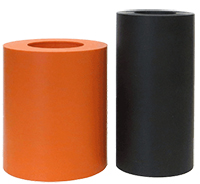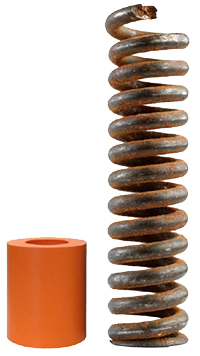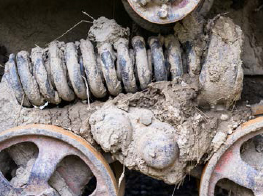
With safety as Priority #1, use of polymer springs eliminates a potential source of injury and safeguards workers during equipment assembly and installation. Polymer springs are much safer to install compared to steel coil springs because their lowered stored energy reduces the risk of injury and damage due to uncontrolled release.
Product Features:
- Safer. Lower stored energy vs. steel coil spring reduces risk of uncontrolled release
- Smaller. For a given spring force, up to 75% reduction in space allows simple fixturing and assembly
- Lighter. Up to 90% reduction in weight for a given spring force gives equipment designers more degrees of freedom in weight distribution
Polymer Springs: Innovation at Work
- Provide the same compressive spring force as steel coils
- Take up significantly less space in the housing assembly (up to 75% reduction) and allow simple fixturing
- Respond extremely quickly to rapid cycling
- Reduce vehicle weight
Design Expertise

Parker's experienced engineers utilize state of the art design tools including nonlinear Finite Element Analysis (FEA) to design and validate material and geometry combinations that produce optimal force deflection curves to meet application requirements.
Safety
In typical track tensioner spring configurations of light-weight mobile equipment such as skid loaders, steel coil springs provide tensioning for the track as it encounters major obstacles such as pot-holes and boulders. During installation of the spring tensioner assemblies the force required to compress the steel spring is significant. Should any error or difficulty cause an uncontrolled release of the steel coil’s stored energy, there is a high potential for severe damage to personnel and property.
With polymer springs, this danger is virtually eliminated. As polymer springs are installed, the compressive energy is stored within the polymer chains.
Material Science
Parker’s extensive range of materials and knowledge of material properties give us a unique advantage in selecting the appropriate polymer for your application. Polymer springs are manufactured from a variety of thermoplastic elastomers including our proprietary Resilon® polyurethane (TPU), PolyMyte® (TPCE), and other custom engineered materials.

Other benefits include:
- Streamlined Operations & Increased Productivity:
Significantly reduce costs and shorten assembly time by eliminating operations associated with managing large amounts of potential energy - Field Repairable Assemblies: Safe and convenient installation of track tensioning springs makes this system field repairable
- Less Corrosion For Longer Life: Thermoplastic elastomer resists corrosion caused by moisture and dirty operating environments
Gallagher is a trusted distributor of Parker Engineered Polymer Systems (EPS). To learn more about Parker Polymer Springs, visit Parker's website.
